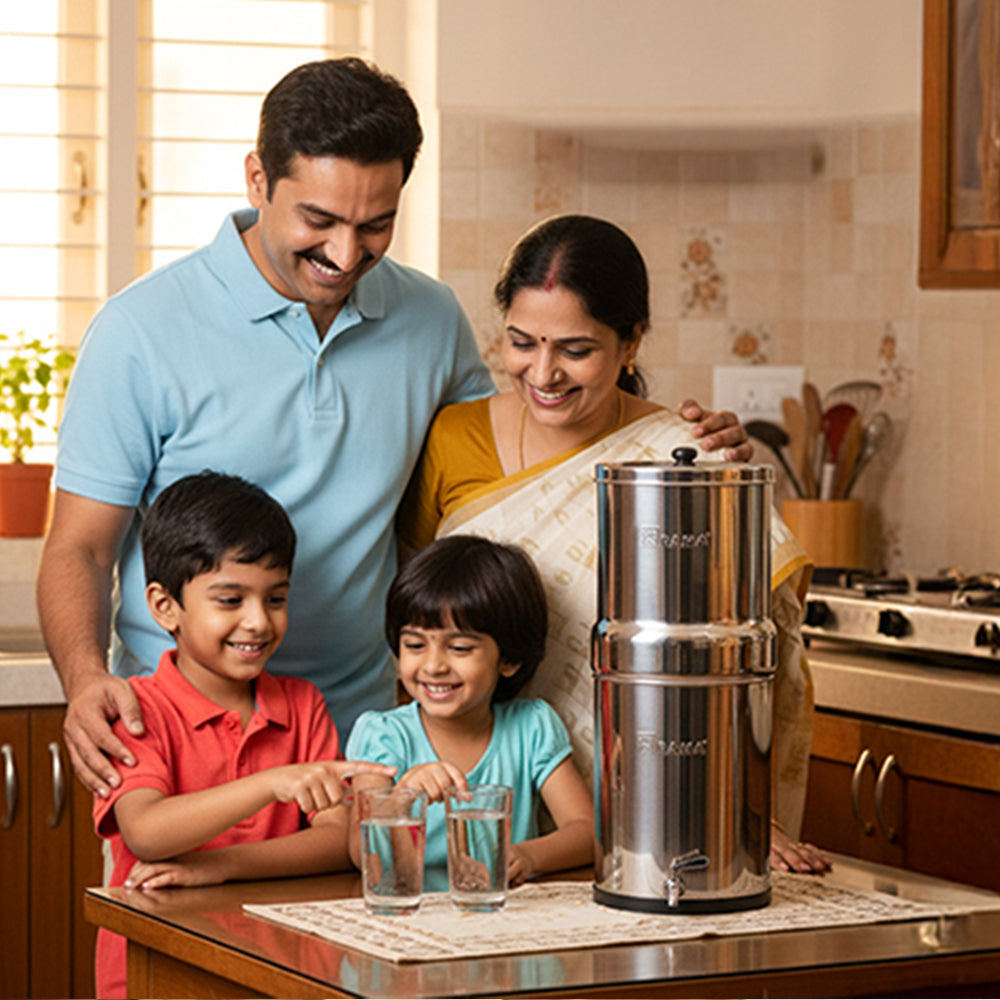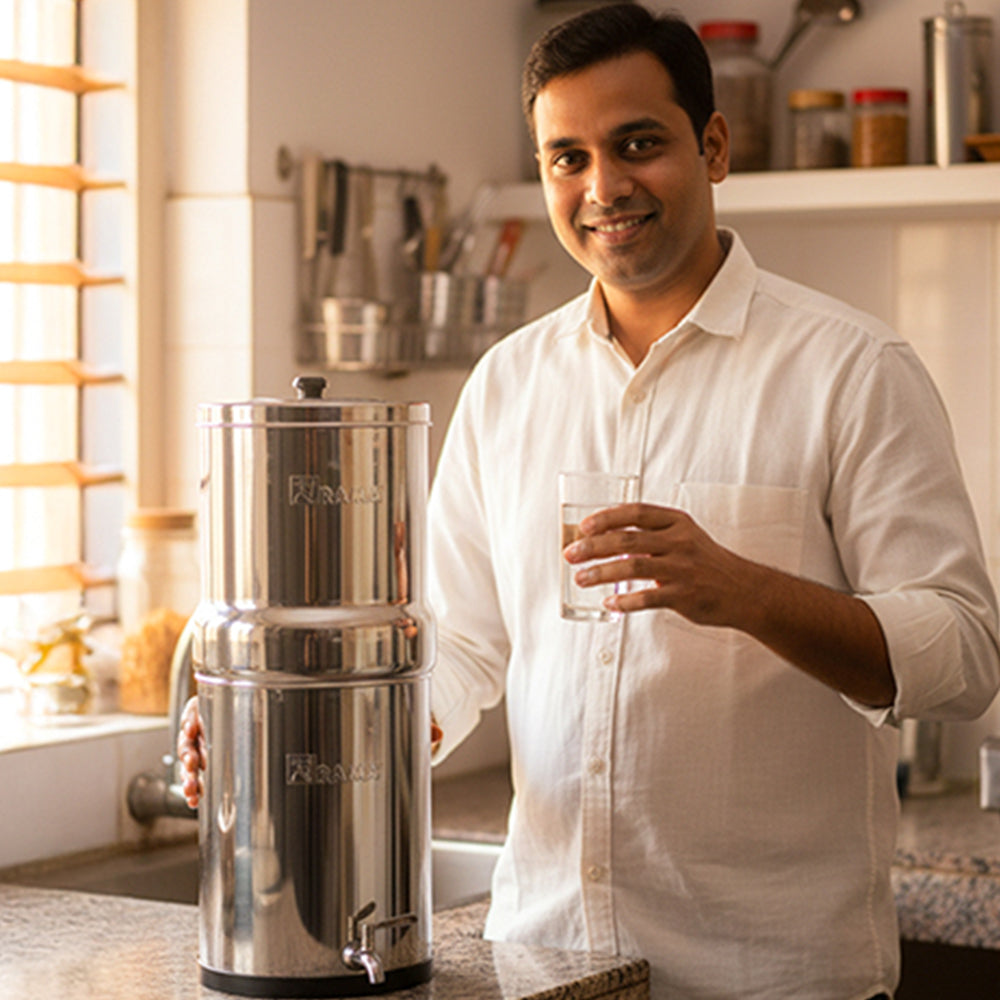Choosing Safe Water: Gravity Filters vs. Canned Water

Safe Drinking Water: Everything You Need to Know
Water is a unique and dedicated gift from nature, and the evaluation of life and water are intricately linked.
Water is essential for human survival. Our bodies are composed of approximately 60% water, and we rely on water for many critical biological functions, including digestion, circulation, temperature regulation, and waste elimination. Without an adequate supply of clean water, humans cannot survive as healthy.
Rama Gravity Water Filter:
One of the most popular and trusted gravity water filters in the Indian market. It has a stainless steel body that can hold up to 16 litres of water based on the capacity you choose.
It uses carbon & spirit ceramic filter elements that can remove many chemical contaminants from water, including bacteria, viruses, chemicals, metals, and plastics. It has a long lifespan and the filter element has a fast flow rate.
WHAT IS GRAVITY WATER FILTRATION AND HOW DOES IT WORK?
Gravity water filters are a type of water purification system that uses the natural force of gravity to filter out contaminants from water. They are simple, effective, and affordable, making them a popular choice for many people who want to improve the quality of their drinking water.
Gravity filtration is a method of separating insoluble particles from a liquid. It uses gravity to pull the particles down, allowing the liquid to pass through, leaving only the solid particles behind.
In the past, water was taken directly from natural waterfalls or extracted from rivers to be treated and distributed. Despite being difficult to manage, natural waterfalls are responsible for the deaths of millions of people due to polluted water, unsanitary living conditions, and the presence of disease-causing organisms and chemical pollutants in the water. We are aware that unfiltered drinking water can lead to a variety of diseases and we are of the opinion that gravity water filters are safer options for avoiding infection against bottled water.
Gravity water filters work by having two chambers, one on top of the other, separated by a filter element. The upper chamber holds the raw water, which can be from any source, such as tap water, rainwater, or river water. The lower chamber collects the filtered water, which is ready to drink or use for cooking. The filter element can be made of different materials, such as ceramic, carbon, or ion exchange resin. Depending on the type and quality of the filter element, gravity water filters can remove various contaminants from water, such as bacteria, viruses, parasites, chemicals, metals, and plastics.
SOME OF THE HEALTH BENEFITS OF GRAVITY-FILTERED DRINKING WATER
- Gravity water filters are easy to use and maintain. You just need to fill the upper chamber with water and let gravity do the rest. You also need to clean and replace the filter element periodically, depending on how often you use it and how dirty the water is.
- Gravity water filters are portable. You can use them at home or outdoors. You can also move them around easily and store them when not in use. They don't require electricity or plumbing, so you can use them anywhere you have access to water.
- Gravity water filters are economical and environmentally friendly. They can save you money on bottled water and reduce plastic waste. They also last for a long time and have a low operating cost. Some filter elements can filter up to thousands of litres of water before needing replacement.
HOW DO YOU MAKE SURE THAT THIS WATER IS FIT FOR HEALTHY DRINKING?
TREATMENT:
The water should be treated to remove the specific unhealthy contaminants or impurities. This can be done through various methods such as filtration, disinfection, and chemical treatment.
TESTING:
The water should be regularly tested for any contaminants or impurities to ensure that it meets the required safety standards. Testing can be done by public health departments or private laboratories.
MONITORING:
The water source should be monitored regularly to identify any potential sources of contamination. This can include monitoring the surrounding land use, agricultural activities, and residential activities.
PROS & CONS OF BUYING / USING A GRAVITY-FILTERED WATER
Cost-effective:
It is a one-time investment that will save you money in the long run, as you won't have to keep buying canned water.
Better for the environment:
By using gravity-filtered water, you are reducing the amount of plastic waste that ends up in landfills and oceans.
High-quality water:
Removes impurities and contaminants that water bottles may not, providing you with better quality water.
Convenience:
Gravity-filtered water systems can provide you with clean drinking water on demand, without the need to leave home or carry a heavy water bottle around.
Takes Time to Adapt:
It takes time to adapt its taste after being used with canned water.
Requires maintenance:
Gravity filters typically require periodic cleaning and replacement of the filter cartridge or elements to maintain their effectiveness.
Dependence on a reliable water source:
Gravity filters and purifiers rely on a consistent flow of water to function properly. If the water source is intermittent or unreliable, the filter may not be able to provide a consistent supply of clean water.
Filter yearly Replacement:
Although gravity filters are generally less expensive than other types of water filtration systems, the cost can still be a factor for some people, especially if they need to purchase replacement filter elements frequently.
PROS & CONS OF BUYING / USING CANNED WATER
Safer than tap water:
Canned water is usually sourced from natural springs or purified sources, making it safer than tap water.
Longer shelf life:
Canned water has a longer shelf life compared to bottled water. It can last up to several years, depending on the storage conditions.
Availability:
It is widely available in almost every store, making it easy to access.
Lightweight:
Plastic cans are typically lighter than gravity counterparts, which can make them easier to transport and handle.
Convenience:
Plastic cans are easy to open and reseal, which can be convenient for on-the-go consumers who want a quick and easy way to access their water.
Purity:
Canned water is often treated and purified to remove all contaminants from its source, making it safe to drink.
Cost:
Canned water is often more expensive than gravity-filtered water.
Quality is Questionable & Lack of Fresh Water:
Each time have to ensure that the water is filled in a safe environment. And we need to store in addition of quantity, which occupies more space and could not get fresh water.
Environmental impact:
Plastic cans are 100% non-recyclable. Single-use water bottles contribute to plastic waste and pollution. The standard specified can be valid for a certain period of time which removes the overall minerals in certain types.
Quality of water:
The quality of water in canned water may not be as high as that from a gravity-filtered water system. only a few canned waters are under the standard of BIS & FSSAI levels.
Potential health risks:
Bacteria can grow in water bottles that are not properly cleaned, which can lead to health issues. processed water fits for healthy drinking in 10% possibility of canned water making. It only does filtration and is used for dehydration which leads the health risks in future.
Therefore, when choosing a water filter, you need to consider several factors, such as calcium, magnesium etc.., The quality and source of your water. You need to know what contaminants are present in your water and how much they affect your health and taste. You also need to know how reliable and accessible your water source.
Also, you know about the type and performance of the filter element. You need to compare different filter elements based on their material, lifespan, capacity, flow rate, and contaminant removal capability.
You also need to check if they have any certifications or testing results from reputable organizations. The size and design of the filter system. You need to choose a filter system that suits your needs and preferences. You need to consider how much water you use daily, how much space you have available, and how easy it is to assemble and operate.
Overall, when deciding between a gravity-filtered water system and canned water, it's important to consider your priorities and lifestyle. If you prioritize convenience and portability, a water bottle may be the better option for you. However, if you prioritize high-quality water and environmental sustainability, a gravity-filtered water system may be the better choice.
Rama Gravity Filtered Water: The Versatile and Safe Solution for Drinking and Cooking. Whether you need it for a refreshing glass of water or for preparing your favourite meals, filtered water offers peace of mind and high-quality results. Discover the benefits of using filtered water and how it can enhance your daily routine.
Prioritise the gravity-filtered water that is available 24/7 and is of high quality with healthy minerals.





